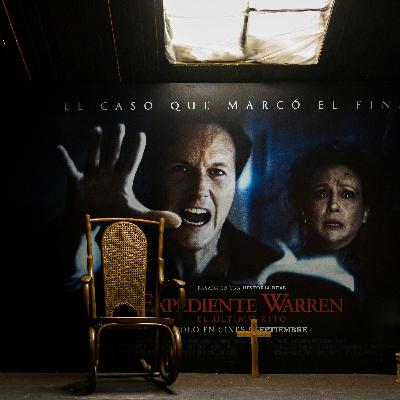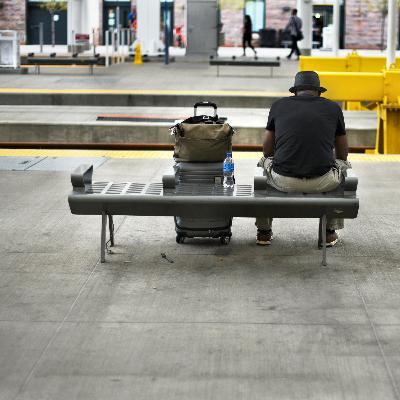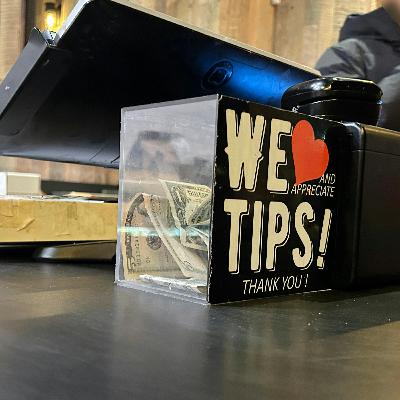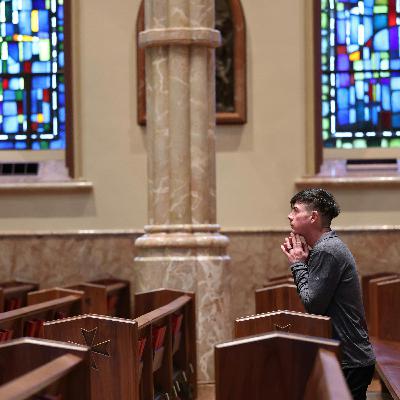Discover Explain It to Me
Explain It to Me

Explain It to Me
Author: Vox
Subscribed: 59,604Played: 1,747,976Subscribe
Share
© 2019 Vox Media, Inc. All Rights Reserved
Description
Should I buy a house? Why do I say “like” so much? Should Gen Z bother to save for retirement?
Explain It to Me is the hotline for the issues that matter to your life. Send us your questions about health, personal finance, relationships, and anything else that matters to you. Host Jonquilyn Hill will take you on a journey to find the answers, whether it's to the halls of Congress or the local bar. You’ll get the answers you were looking for, and sometimes ones you didn't expect — and always with a dose of humor. New episodes every Sunday. Part of Vox and the Vox Media Podcast Network.
777 Episodes
Reverse
Americans seem to be getting ruder. Are our attempts at making ourselves better actually making us worse?
This episode was produced by Avishay Artsy, edited by Miranda Kennedy, fact-checked by Melissa Hirsch and Isabelle Lichtenstein, engineered by Matthew Billy and hosted by Jonquilyn Hill. Image: Francesco Carta Fotografo/Getty Images.
If you have a question, give us a call on 1-800-618-8545 or send us a note here. Listen to Explain It to Me ad-free by becoming a Vox Member: vox.com/members.
Learn more about your ad choices. Visit podcastchoices.com/adchoices
Hollywood has always made money from vampires and brain-eating zombies. But this year's a record-breaker thanks to sequels, hilariously unlikely creators, and pure thrills.
This episode was produced by Denise Guerra and Hady Mawajdeh, edited by Miranda Kennedy, fact-checked by Melissa Hirsch, engineered by Adriene Lilly and hosted by Jonquilyn Hill.
A detail from The Conjuring Museum Of The Occult based on "The Conjuring" films. Photo by David Benito/Getty Images.
If you have a question, give us a call on 1-800-618-8545 or send us a note here. Listen to Explain It to Me ad-free by becoming a Vox Member: vox.com/members.
Learn more about your ad choices. Visit podcastchoices.com/adchoices
From #rushtok to country music, American culture is getting more and more southern.
This episode was produced by Denise Guerra, edited by Miranda Kennedy, fact-checked by Melissa Hirsch, engineered by Matthew Billy and Adriene Lilly and hosted by Jonquilyn Hill. Photo of a Beyonce fan waiting to see her perform in LA by Rashida Zagon/For The Washington Post via Getty Images.
If you have a question, give us a call on 1-800-618-8545 or send us a note here. Listen to Explain It to Me ad-free by becoming a Vox Member: vox.com/members.
Learn more about your ad choices. Visit podcastchoices.com/adchoices
Americans are flocking to gyms and fitness classes. It wasn't always that way.
This episode was produced by Hady Mawajdeh, edited by Miranda Kennedy with help from Naureen Khan, fact-checked by Melissa Hirsch, engineered by Andrea Kristinsdottir and hosted by Jonquilyn Hill. Photo of an outdoor group fitness class by ANDREW CABALLERO-REYNOLDS/AFP via Getty Images.
If you have a question, give us a call on 1-800-618-8545 or send us a note here. Listen to Explain It to Me ad-free by becoming a Vox Member: vox.com/members.
Learn more about your ad choices. Visit podcastchoices.com/adchoices
We track our steps and our sleep, guzzle supplements and protein shakes, and even inject hormones – all in the name of wellness.
This episode was produced by Hady Mawajdeh, edited by Naureen Khan and Miranda Kennedy, fact-checked by Melissa Hirsch, engineered by Andrea Kristinsdottir, and hosted by Jonquilyn Hill. Photo by Jeffrey Greenberg/Universal Images Group via Getty Images.
If you have a question, give us a call on 1-800-618-8545 or send us a note here. Listen to Explain It to Me ad-free by becoming a Vox Member: vox.com/members.
Learn more about your ad choices. Visit podcastchoices.com/adchoices
Americans are investing billions in their health and wellness. What good do all these green powders and costly club memberships actually do?
This episode was produced by Hady Mawajdeh, edited by Miranda Kennedy, fact-checked by Melissa Hirsch, engineered by Matthew Billy, and hosted by Jonquilyn Hill. Image of a guest floating in a saline sensory deprivation pool at the Chiva Som Health Resort by Peter Charlesworth/LightRocket via Getty Images.
If you have a question, give us a call on 1-800-618-8545 or send us a note here. Listen to Explain It to Me ad-free by becoming a Vox Member: vox.com/members.
Learn more about your ad choices. Visit podcastchoices.com/adchoices
The US is well behind much of the world in building passenger rail, especially high-speed trains. But we do have one major advantage.
This episode was produced by Devan Schwartz, edited by Naureen Khan, fact-checked by Melissa Hirsch, engineered by Patrick Boyd with help from Andrea Kristinsdottir and hosted by Jonquilyn Hill. Photo by Robert Alexander/Getty Images.
If you have a question, give us a call on 1-800-618-8545 or send us a note here. Listen to Explain It to Me ad-free by becoming a Vox Member: vox.com/members.
Learn more about your ad choices. Visit podcastchoices.com/adchoices
From raising the tipped minimum wage to "no tax on tips," we look at the challenges of remaking tipped work.
This episode was produced by Peter Balonon-Rosen, edited by Miranda Kennedy, fact-checked by Melissa Hirsch, engineered by Patrick Boyd and hosted by Jonquilyn Hill. Photo by Lindsey Nicholson/UCG/Universal Images Group via Getty Images.
If you have a question, give us a call on 1-800-618-8545 or send us a note here. Listen to Explain It to Me ad-free by becoming a Vox Member: vox.com/members.
Learn more about your ad choices. Visit podcastchoices.com/adchoices
Summer. Time for pools, BBQs, and the beach read. But why do we read "summer books"?
This episode was produced by Avishay Artsy, edited by Amina Al-Sadi, fact-checked by Melissa Hirsch, engineered by Matthew Billy, and hosted by Jonquilyn Hill. Photo by Jakub Porzycki/NurPhoto via Getty Images.
Further Reading: Bad Witches by H.B. Akumiah and Constance Grady's newsletter from Vox. Further listening: Limousine podcast.
If you have a question, give us a call on 1-800-618-8545 or send us a note here. Listen to Explain It to Me ad-free by becoming a Vox Member: vox.com/members.
Learn more about your ad choices. Visit podcastchoices.com/adchoices
More and more of us are interacting with chatbots. Can we have real relationships with AI, and can AI teach humans to be better people?
This episode was a collaboration with Vox's Future Perfect team. It was produced by Denise Guerra, edited by Miranda Kennedy, fact-checked by Kim Slotterback, engineered by Patrick Boyd and hosted by Jonquilyn Hill. Photo by Frank Rumpenhorst/picture alliance via Getty Images.
If you have a question, give us a call on 1-800-618-8545 or send us a note here. Listen to Explain It to Me ad-free by becoming a Vox Member: vox.com/members.
Learn more about your ad choices. Visit podcastchoices.com/adchoices
Beyoncé and Kendrick Lamar openly celebrate the American flag. But a lot of Black Americans feel differently. What does that tell us about identity today?
This episode was produced by Victoria Chamberlin, edited by Miranda Kennedy, fact-checked by Melissa Hirsch, engineered by Andrea Kristinsdottir and hosted by Jonquilyn Hill. Image of Kendrick Lamar performing at the Super Bowl LIX Halftime Show by Gregory Shamus/Getty Images.
If you have a question, give us a call on 1-800-618-8545 or send us a note here. Listen to Explain It to Me ad-free by becoming a Vox Member: vox.com/members.
Learn more about your ad choices. Visit podcastchoices.com/adchoices
So many of us believe we understand what our pets are feeling. Are we fooling ourselves?
This episode was produced by Miles Bryan, edited by Miranda Kennedy and Naureen Khan, fact-checked by Melissa Hirsch, engineered byPatrick Boyd and hosted by Noam Hassenfeld. Photo by Kylie Cooper for The Washington Post via Getty Images.
If you have a question, give us a call on 1-800-618-8545 or send us a note here. Listen to Explain It to Me ad-free by becoming a Vox Member: vox.com/members.
Learn more about your ad choices. Visit podcastchoices.com/adchoices
Unpacking the American rite of passage that so many children love — but that isn't right for everyone.
This episode was produced by Devan Schwartz, edited by Miranda Kennedy, fact-checked by Sarah Schweppe, engineered by Matthew Billy and hosted by Jonquilyn Hill. Photo by Maskot/Getty Images.
If you have a question, give us a call on 1-800-618-8545 or send us a note here. Listen to Explain It to Me ad-free by becoming a Vox Member: vox.com/members.
Learn more about your ad choices. Visit podcastchoices.com/adchoices
A caller asks why it's so hard to make biking safe in LA. We bike around different US cities to get the answer.
This episode was produced by Miles Bryan, edited by Miranda Kennedy, fact-checked by Colleen Barrett, engineered by Matthew Billy, and hosted by Jonquilyn Hill. Photo of a cyclist in a bike lane intersection in Washington, DC by Kevin Carter/Getty Images.
If you have a question, give us a call on 1-800-618-8545 or send us a note here. Listen to Explain It to Me ad-free by becoming a Vox Member: vox.com/members.
Learn more about your ad choices. Visit podcastchoices.com/adchoices
Press-on nails, new music from Katy Perry, and an uptick in Klarna purchases: signs of an economic downturn or no?
This episode was produced by Hady Mawajdeh, edited by Miranda Kennedy, fact-checked by Melissa Hirsch, engineered by Matthew Billy, and hosted by Jonquilyn Hill. Photo of Katy Perry performing in Sydney, Australia by Nina Franova/Getty Images.
If you have a question, give us a call on 1-800-618-8545 or send us a note here. Listen to Explain It to Me ad-free by becoming a Vox Member: vox.com/members. Help us plan for the future of Explain It to Me by filling out a brief survey: voxmedia.com/survey. Thank you!
Learn more about your ad choices. Visit podcastchoices.com/adchoices
For the first time in decades, American Christianity is not in decline. What are young people looking for–and finding–at church?
Further reading: The surprising chasm splitting Americans along religious lines by Christian Paz. Pew report: Decline of Christianity in the U.S. Has Slowed, May Have Leveled Off.
This episode was produced by Gabrielle Berbey, edited by Miranda Kennedy, fact checked by Melissa Hirsch, engineered by Matthew Billy, and hosted by Jonquilyn Hill. Photo of a parishioner praying at Chicago’s Holy Name Cathedral by Scott Olson/Getty Images.
If you have a question, give us a call on 1-800-618-8545. Or send us a note here. Listen to Explain It to Me ad-free by becoming a Vox Member: vox.com/members. Help us plan for the future of Explain It to Me by filling out a brief survey: voxmedia.com/survey. Thank you!
Learn more about your ad choices. Visit podcastchoices.com/adchoices
It feels like sneezing season lasts longer and takes more victims every year. An allergist and a public health specialist explain how to fight back.
This episode was produced by Devan Schwartz, edited by Miranda Kennedy, fact-checked by Melissa Hirsch, engineered by Matthew Billy, and hosted by Jonquilyn Hill. Photo by Bernd Weißbrod/picture alliance via Getty Images.
If you have a question for us, give us a call on 1-800-618-8545 or send us a note here.
Listen to Explain It to Me ad-free by becoming a Vox Member: vox.com/members.
Correction: This episode mentions Xarelto as a potential allergy medication. It is not.
Help us plan for the future of Explain It to Me by filling out a brief survey: voxmedia.com/survey. Thank you!
Learn more about your ad choices. Visit podcastchoices.com/adchoices
With the at-home DNA testing company 23andMe filing for bankruptcy, what happens to all the data millions of Americans handed over? And how should you approach the family you've found through sites like these?
If you have a question, give us a call on 1-800-618-8545. Or send us a note here.
Listen to Explain It to Me ad-free by becoming a Vox Member: vox.com/members
This episode was produced by Hady Mawajdeh, edited by Miranda Kennedy, fact-checked by Melissa Hirsch, engineered by Patrick Boyd and Brandon MacFarland and hosted by Jonquilyn Hill.
Photo of 23andMe Ancestry + Traits Service DNA kit by Tiffany Hagler-Geard/Bloomberg via Getty Images.
Help us plan for the future of Explain It to Me by filling out a brief survey: voxmedia.com/survey. Thank you!
Learn more about your ad choices. Visit podcastchoices.com/adchoices
Fashion has made a big swing from a strict set of rules to the idea that we should all just wear what we want. But personal style is still dictated by outside forces. And a lot of people don't even know where to start.
This episode was produced by Victoria Chamberlin, edited by Jolie Myers, fact checked by Melissa Hirsch, engineered by Matthew Billy, and hosted by Jonquilyn Hill.
Image of Clinton Kelly and Stacy London by Donna Svennevik/Disney General Entertainment Content via Getty Images.
If you have a question for us, give us a call at 1-800-618-8545 or send us a note here.
Listen to Explain It to Me ad-free by becoming a Vox Member: vox.com/members.
Help us plan for the future of Explain It to Me by filling out a brief survey: voxmedia.com/survey. Thank you!
Learn more about your ad choices. Visit podcastchoices.com/adchoices
With 401(k)s taking a hit and the fate of Social Security uncertain, we get some advice for how to talk to the elders in your life about work and retirement.
This episode was produced by Carla Javier and Gabrielle Berbey, edited by Miranda Kennedy, fact-checked by Melissa Hirsch, engineered by Andrea Kristinsdottir, and hosted by Jonquilyn Hill. Photo credit: Momo Productions/Getty Images.
Call us with your questions about personal style: 1-800-618-8545. You can also send us a note at vox.com/askvox.
Listen to Explain It to Me ad-free by becoming a Vox Member: vox.com/members.
Learn more about your ad choices. Visit podcastchoices.com/adchoices





























I signed up for SS one year ago and started receiving SS this January Who ever said they could get a hold of SS in 15 min before was lying. I did find out if you call at 8am it’s far less of a wait.
theres a serious lack of critical thinking 9n your part if youre having a guest tell you they had to quit their ǰob because car headlights were "emotionally disturbing him" DURING THE DAY and youre not even pushing back or questioning that insane assertion at all. unsubscribed.
If you're a gastropod, you're a slug, snail, mollusk. A gastrophile perhaps what was meant. :-)
stopped listening when the guy used the term "playing spoiler" on a general interest podcast without explaining what it means.
This episode is really educational.MassShooters
good
I'm truly not one of those nitpicky people who has the propensity to complain about everything, but the vocal fry of the guest made this conversation absolutely unbearable to listen to. I couldn't make it more than ten minutes before I gave up.
Please stop using the term "birthing person" until you cite me a case where a man gave birth.
One of the most disingenuous political podcasts out in leftist media
fuck the new York times
"I would never think of enlisting in the Army. I would rather live, not die." what an arrogant, ignorant, and snobbish think to say. I have served in the Army for almost 20 years and I too would rather live than die. That is not what differentiates those who choose to serve from those that do not. I listen to The Weeds podcasts to hear intelligent conversations about major issues but that was some sophomoric bullshit.
One of my favorite episodes so far
if black kids are not taking advance courses who's fault is that? not all kids black & white can take advance courses that being said education starts day one. if a kid is failing in school who needs to take charge? the parents.
I don't know any school.that doesn't teach slavery. or teaches whites are better than black people. disagree? show me. we have class privilege over white privilage. why doesn't one black leader come out, write exactly what CRT is, put it on paper & send out press releases? take questions & be open when people disagree with you? people fear change. people do not want to be blamed for someone else failures when they 1. they are having a hard time themselves 2. none of their relatives owned slaves or were slaves. 3. black people want us to listen to them but they refuse to listen to whites, it's ok to call whites names & reduce them to a label you. not vise versa
The most racist people I know voted for Obama. They had hope for change & didn't see a black man. They saw that guy they worked with who was a work friend. Then Fox news went into overdrive.
Fascinating conversation
read this title having not checked the news in two hours and it nearly gave me a heart attack. jeeze.
I'm really confused. how is the argument that we should put aside or differences to take down the powerful, wealthy elites not a class argument?
This podcast contained the best argument I've actually heard thus far to actually vote for Biden, rather than simply against Trump, as a leftist. If Biden is actually non-ideological (rather than ideologically neoliberal which idk), and is forced (and also able) to remove the filibuster, the left wing of the party will be in a position to bargain in congress with the dems for real change. there's a number of assumptions there, but none are too, too crazy. it's at least worth thinking about. certainly more than "we can push him left after he gets into office". the outcome looks the same, but this has an actual mechanism by which it could work. so thank you and good job. you've given me more to think about.
it would be great to get reference to some of the statics and Data discussed